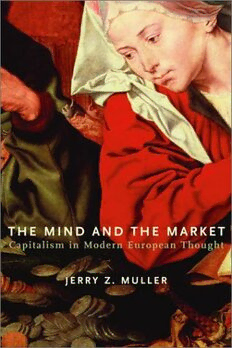
The Mind and the Market: Capitalism in Modern European Thought PDF
505 Pages·2002·88.726 MB·English
Most books are stored in the elastic cloud where traffic is expensive. For this reason, we have a limit on daily download.
Preview The Mind and the Market: Capitalism in Modern European Thought
Description:
A remarkable history of the idea of capitalism in Western thought–—from its origins in classical Greece and Rome and in medieval Christianity, through its flowering from 1700 to the present day—that examines the most significant thinkers who have influenced our views on how the market can (and should or should not) affect the way society is organized.Capitalism is too complex a subject to be left to economists, and achieving a critical comprehension of it requires perspectives beyond those characteristic of modern economics. European thinkers have debated the cultural, moral, and political effects of capitalism for centuries, and their claims have been many and diverse. Historian Jerry Muller tracks this fascinating thread, setting out what the best and brightest—from Hobbes to Hayek, and across the ideological spectrum, including Voltaire, Adam Smith, Edmund Burke, Hegel, Marx, and Matthew Arnold, as well as twentieth-century communist, fascist, and neoliberal intellectuals—have thought about the ramifications of capitalism and its future implications. In doing so, he also shows how antisemitic stereotypes about Jews and their relationship to money have played an ongoing role in the interpretation of capitalism.The result is a compelling history of ideas and a riveting exploration of questions—about wealth and poverty, capitalism and culture, the individual and the state, and the role of intellectuals within market societies—that still compel our attention.
See more
The list of books you might like
Most books are stored in the elastic cloud where traffic is expensive. For this reason, we have a limit on daily download.
